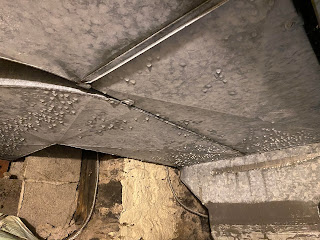Why Are The Air Conditioning Ducts Sweating?

We are conducting an inspection on a hot day and the air conditioning is running; which is something I am always grateful for. In the basement, attic, or crawl space we see the ducts or the air handler sweating. Sometimes we see the copper suction line sweating. Our client asks; “why is there water droplets on the ducts (or unit)”? I have heard home inspectors give different answers to this issue. I know some say this is “normal”. Normal does not mean acceptable, and I take issue with “normal”. Sweating ducts can cause mold issues in areas we can’t see over time. I have seen ceilings covered with mold from sweating air conditioning ducts. One of the issues I see overlooked by not only home inspectors, but installers is the size of the air conditioning system. I hear installers say; “we use 3 ton units on all houses”. Sure they won’t get a call back. The homeowner sets the temperature to 60-65, and the house is cold, but not properly dehumidified. I have seen “professionals” recommend that a dehumidifier is installed to control sweating ducts. A properly sized unit should dehumidify the air. Actually this is the most important part of a properly sized system. I have seen people set the temperature at 60 degrees F! Air conditioning is about humidity reduction. A 78 degree, 48% humidity house will feel great. A house at 60 degrees and 90% humidity will feel cold and clammy because the humidity has not been properly reduced. An oversized unit will shut down long before the house is properly dehumidified. An air conditioning system that is too large will run in shorter cycles of less than 12 minutes. This is because the system will quickly cool the air and shut the thermostat down without properly cooling the entire space. This causes the system to shut off without running long enough to cool the furthest rooms in the house and properly dehumidify. The thermostat should be set around 78 degrees F. If you set the air conditioning temperature higher, then the temperature of the return air will also be higher and there will be less chance of sweating. Short cycles will cause temperature variations and areas of the house that are not properly dehumidified. 1 ton of cooling (12,000 BTU’s) should be adequate for every 1000 square feet of well insulated space. This number could be higher or lower depending on many factors including; house layout, insulation, air leakage, etc. Always recommend your client seek the advice of a qualified HVAC contractor. So what else may cause air conditioning ducts to sweat?
- Duct Insulation – Duct insulation is most important. We have cold, dehumidified air traveling in a space that is hot and humid through a thin metal duct. The same analogy applies to a cold glass of water sitting on a table on a hot summer day. All ducts should be properly sealed. Gaps or missing insulation will cause air loss and moisture.
- Sealing a Crawl Space – If the crawl space is not properly insulated, including a proper vapor barrier on the floor that will increase the chances of condensation on the ducts.
- Proper Attic Ventilation – I know many individuals don’t recommend attic ventilation anymore (which I disagree with), however a very hot attic, with cold ducts running through it, will cause condensation.
- Poor Air Flow – The biggest reason for this is a clogged or dirty filter. This is the easiest fix of all. I have seen furnace heat exchangers ruined because of a clogged filter. Damaged, dirty, or blocked vents can also cause improper air flow.
- Icing of the Evaporator Coils – Causes of this are a clogged air filter, dirty coils, or an undersized or improperly functioning system.
- Blocked Condensate Discharge – Chilled condensate water will back up into the condensate tray in the air handler mixing with the warmer air creating condensation.
Related Articles:
- Inspecting Heating / Cooling Ducts
- Inspecting Mini Split Heat Pumps
- Heat Pump / Air Conditioning Federal Requirements
- Why is the Air Conditioner Not Cooling Properly?
Want To Learn More? Click HERE to Search Our Full Database Of Home Inspector Newsletters.



